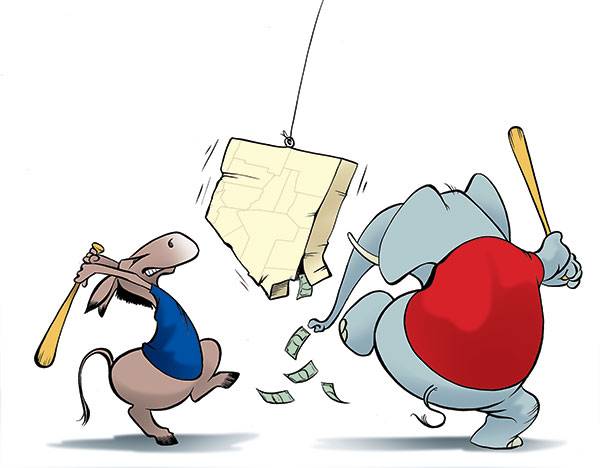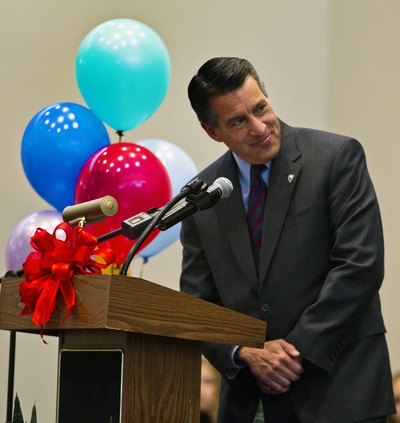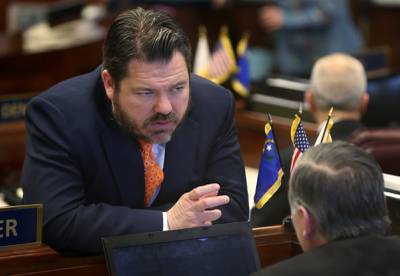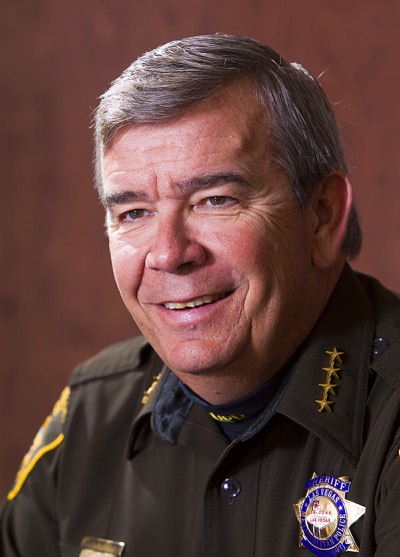Sunday, Jan. 19, 2014 | 2 a.m.
Sun coverage
Nevada's politicians dropped millions of dollars in campaign expenditures last year — and collected millions more, too.
Disclosures provided under state law last week provide a glimpse behind the curtain of Nevada's political world and offer a first look at the strength of candidates in the 2014 election. Voters can see who's donating to the elected officials and candidates who are vying for the right to make important decisions for Nevada's communities, schools, roads, parks, health care, safety, business and the economy.
"It strikes at the heart of the public state and the process," said Secretary of State Ross Miller of the campaign reports filed Jan. 15. "The public should be able to discern from publicly available information who is funding campaigns."
While political insiders are crowing among themselves about hefty campaign hauls, the money matters to voters, too.
"Money is the mother's milk of politics, and candidates with more money are more formidable opponents," said Eric Herzik, UNR political science department chairman.
So, if you have an interest in who makes decisions for public schools, roads and police, and who sets your tax rates and regulates your workplace, looking at money in state politics might be worthwhile.
Based on an examination of hundreds of disclosure reports, here are the takeaways:
Gov. Sandoval: $3.1 million
Republican Gov. Brian Sandoval looks to be coasting to re-election, posting a whopping $3 million in campaign contributions from a wide array of donors in 2013.
The first-term governor has been on the campaign trail for months, posting photos of campaign stops on social media and collecting donations along the way. His campaign staff claims to have thousands of volunteers and hundreds of precinct captains ready to shepherd voters to the polls.
Although the governor spent nearly $1 million last year, campaign staffers say the governor has $3.1 million in the bank. But the campaign isn't bragging.
"We are aren't taking anything for granted and look forward to running a campaign that reaches every Nevadan," said Jeremy Hughes, campaign director for Sandoval.
The true figure is impossible to know because Nevada law doesn't require elected officials or candidates to tell the public how much money they have, only how much they collected and spent.
Senate Majority Leader Harry Reid weighed in on Sandoval's impressive fundraising, saying "money means a lot in politics, it always has."
Reid, the top Nevada Democrat, has not said whom Democrats will position against Sandoval, but suggested that "obviously the race isn't going to be determined only by money."
"Demographics would support somebody from the southern part of the state," he said.
Cash flows in battle for control of state Senate
Both Democrats and Republicans in the state Senate raised more than $1 million in 2013.
Democrats currently hold 11 seats and Republicans have 10, and each party wants control because the party in the majority sets the agenda.
There are three competitive races in the Senate this year, and both Democrats and Republicans are expecting to spend millions of dollars in three Clark County races:
• In Senate District 20, Senate Minority Leader Michael Roberson, R-Henderson, raised $310,000, and Democratic challenger Teresa Lowry brought in $63,000 during her first few months on the campaign trail.
Republican primary challenger Carl Bunce raised about $7,500 and spent most of it.
• In Senate District 9, Sen. Justin Jones, D-Las Vegas, raised about $236,000 while Republican challenger Becky Harris took in $129,000. Harris faces a primary challenge from Vick Gill, who collected $63,000 in 2013.
• In Senate District 8, an open seat offers room for both Democrat Marilyn Dondero Loop and Republican Patricia Farley, who raised $110,000 last year. Loop, a state assemblywoman, raised $37,000, but Democrats say she was focused on family matters before jumping into the Senate race in December, giving her scant time to collect money before the Jan. 15 disclosure date.
Big money in race for lieutenant governor
For a part-time office with few responsibilities, candidates collected unprecedented amounts of money in the lieutenant governor race.
Why?
"The lieutenant governor race, which never, never matters, does matter now depending on what a re-elected Brian Sandoval does in 2016," said Fred Lokken, a political science professor at Truckee Meadows Community College.
If Sandoval is re-elected, political insiders see him angling for a jump to national office or a run for U.S. Senate. A successful run would mean the lieutenant governor would become governor.
That's why you see candidates like Republican Sen. Mark Hutchison bringing in $876,000 for the race.
His GOP primary opponent, former U.S. Senate candidate Sue Lowden, collected $228,000, and presumptive Democratic candidate Lucy Flores brought in $83,000, although she spent most of it last year.
Both Hutchison and Lowden have been trying to lock up support for the June primary election.
"In the primary, you're knocking on the doors of partisan donors, and if they decide 'I'm going to back candidate X,' then candidate Y has a lot harder time getting any money," Herzik said.
Millions of dollars fighting for and against a tax
Voters will have a choice this November to levy a 2 percent tax on Nevada businesses in order to boost state spending on education.
The primary backer of the Education Initiative is the state teachers' union, which contributed $1 million to the Education Initiative PAC.
The Coalition to Defeat the Margins Tax Initiative, a group including major industry groups, raised $700,000 with equal contributions from the Las Vegas Metro Chamber of Commerce and industry groups for the state's mining, gaming and retail industries.
Expect a lot more money to be invested in this fight as proponents pose this as a battle between schoolchildren and absentee corporations that pay nothing for the privilege of doing business in Nevada and opponents who will say the tax will cost jobs and force small businesses to close.
Democrat leading in attorney general race
Miller posted about $925,000 in contributions last year in his bid to become Nevada's next attorney general.
His Republican opponent, Adam Laxalt, just declared for office this month, so he hasn't had the time to raise as much as Miller has.
The fight between the two lawyers pits two Nevada political families against one another. Miller is son of former Gov. Bob Miller, and Laxalt is the grandson of former Gov. Paul Laxalt.
Current Attorney General Catherine Cortez Masto is facing term limits and has not yet declared what she'll do when her term expires at the end of this year.
Lots of money for Clark County Commission incumbents
Three Democratic Clark County Commissioners are up for re-election this year.
All three collected more than $250,000 in 2013.
Such big hauls are a convenient "cold water" tactic to discourage others from entering races, Lokken said.
Commissioner Susan Brager got $480,000 in contributions, Mary Beth Scow received $336,000, and Chris Giunchigliani brought in $258,000.
The three commissioners have no opponents yet.
Sheriff race has leader
With Metro Sheriff Doug Gillespie not seeking re-election, an open sheriff's seat has attracted many candidates seeking the powerful post.
Among them, Metro Police Assistant Sheriff Joe Lombardo is the clear front runner. He raised $505,000.
Former Assistant Sheriff Ted Moody trails with $145,000 raised in 2013. He acknowledged the funding gap in a recent email, saying he always knew he'd be outspent and that his opponent is trying to win with "an avalanche of special interest spending."
Metro Police Capt. Larry Burns brought in $81,000, and former Las Vegas Township Constable Robert "Bobby G" Gronauer raised $15,000.
Political parties both running deficits
Both the official Nevada Democratic and Republican parties ran deficits in 2013.
Although Nevada law makes it impossible to know how much money they had saved up, the Democratic Party had enough to donate hundreds of thousands of dollars to its federal affiliate.
Meanwhile, the Nevada GOP ran a deficit after a fractious year in which major donors declared they were yanking funding from the party.
Candidates throw personal money into campaigns
Dan Schwartz, a Republican candidate for state treasurer, gave his campaign about $225,000 of his own money.
With that sum alone, he outraised Democratic Controller Kim Wallin, the Democratic candidate for treasurer. Wallin, who raised $107,000, did not make any personal loans to her campaign.
Assemblyman Andrew Martin, D-Las Vegas, also donated $100,000 to his own campaign for state controller.
Democratic Treasurer Kate Marshall raised $178,000 in her bid to be the next secretary of state. Marshall's opponent, Republican Sen. Barbara Cegavske, R-Las Vegas, received $78,000 in contributions.
Drawbacks to campaign reports
Although these campaign reports offer the first look at the candidates in the 2014 election, political observers note that the reports are flawed.
Lokken called them a "sham" of disclosure because it's impossible to know how much money candidates have on hand.
"Nevada has some of the worst campaign reporting practices in the country," he said.
The reports also don't shine a light on other money involved in a political race. These days, groups unaffiliated with any candidate or political committee spend lots of money in elections.
Political insiders expect so-called "independent expenditures" to play a large role in the 2014 elections, and Herzik said they're "now part of any campaign's equation."
But these disclosures are the only information the public will have until May 20, when candidates again file how much they've collected and spent.
"This leaves people completely in the dark as to who is funding the campaigns because we'll only have access to that shortly before people go to vote," Miller said, noting he had tried to pass a bill to get candidates to disclose donations within 72 hours of receiving them.






Join the Discussion:
Check this out for a full explanation of our conversion to the LiveFyre commenting system and instructions on how to sign up for an account.
Full comments policy